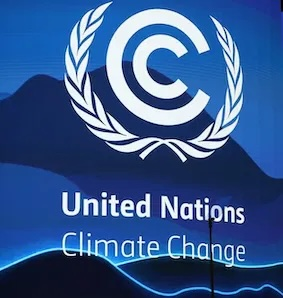Jesuit Missions at UN Climate Change Conference - Day 2: Waiting for Godot

A press conference on Palestine at 10am noted that under the UN climate agreements, governments do not have to report on carbon emissions from their military activity and that carbon emissions resulting from the war in Gaza far outstrip the total emissions of dozens of countries. Military spending in 2023 was apparently 2.44 trillion US dollars - yet developed countries quibble over providing 1.3 trillion dollars a year for climate mitigation and adaptation.
I moved on to a side event on Climate Stories from the Global South. Here we heard about the huge gap between the UNFCCC definition of 'climate finance', supported by developing countries, and the understanding held by developed countries. The first holds that developed countries are obliged to provide funds to developing countries to reduce their carbon emissions and adapt to climate change. The second includes any kind of money from anywhere, including profit-driven loans from private institutions. Much information was provided about the Adaptation Fund, the Global Climate Fund and the Fund for responding to Loss and Damage. These funds have in common that the sums pledged are wholly inadequate and that the sums provided fall far short of what has been pledged.
The delayed opening plenary session was due to begin at 11am, so I hurried to the main meeting room - only to be kept waiting for 40 minutes before an announcement was made that it was postponed until 1pm. So I attended another side meeting: 'Forging synergies for people and planet - transformative actions for a just and sustainable future', held jointly by the UNFCCC and other UN agencies. It looked at the social, environmental and financial benefits of a joined-up approach to UN agreements on Climate, Biodiversity and the Sustainable Development Goals. Three reports are to be published in July looking at the role of finance, including insurance, in tackling climate change, biodiversity loss and catastrophic disasters; the connection between climate action and human health in cities; and the link between conservation, sustainable development and climate action.
The supposed 1pm beginning of the delayed opening plenary was postponed until 3pm. So I attended a useful interfaith networking meeting, then hurried to the 3pm postponed delayed beginning of the opening plenary, but it had been delayed until 4pm; then until 5pm. Meanwhile, forests burnt and glaciers melted and sea levels rose... But at last, at 5pm, the Chairs of the two Subsidiary Bodies, SBI and SBSTA, announced that after days of negotiations, a compromise agenda had been agreed. From various comments made by National Delegations, it was clear that developed countries had been unwilling to address the funding concerns of developing countries, who were justifiably angry. The power of money asserted itself as always. But at least negotiations can now continue on many of the substantive issues, and not simply on the agenda itself. That seemed like a small sign of hope.
Jesuit Missions (JM) Campaigns and Advocacy Officer Richard Solly sends this reflection from the United Nations Climate Change Conference in Bonn, where he is part of the Subsidiary Body on Scientific and Technical Advice.


















